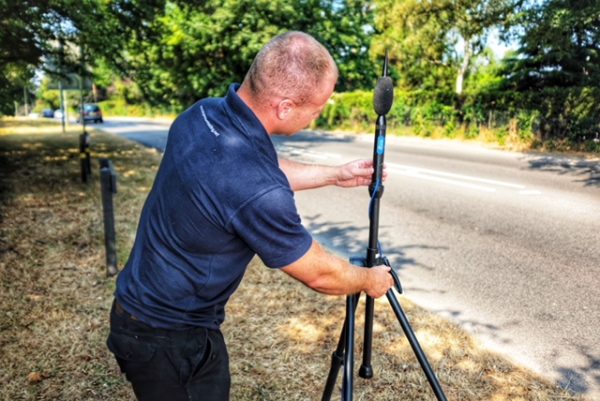Need help with your BS8233 Noise Assessment?
A BS8233 noise report is usually requested at the pre-application stage of planning permission, if the Local Authority considers noise to be a high enough risk to affect the likelihood of the planning application being accepted. The information submitted within a BS8233 noise survey report allows the local Planning Department to assess the level of noise impact expected on the development and ensure appropriate noise mitigation measures are put in to place. The overall purpose of the BS8233 noise survey is to ensure that the development is compliant with the National Planning and Policy Framework and Noise Policy Statement for England.
A BS8233 noise assessment report should be submitted during pre-application discussions or more commonly during a planning application. In some circumstances, a planning condition will be included on the planning permission requiring the submission of a noise report.
In many cases a planning permission officer or the local environmental health team will be the first person involved in informing a client that they are in need of a noise impact assessment, this will typically be due to the fact that a complaint or concern has arisen around the increased noise and/or the perceived increase in noise due to a change of use or an increase in licencing hours.
Our BS8233 noise impact assessment will measure and predict the effects that the new/proposed noise source will be likely have on the current noise climate. This is achieved by firstly establishing a baseline measure of the existing noise climate and then comparing this with the introduced noise. If this comparison cannot be achieved due to practical purposes, then a reasonable prediction can be made through various modelling methods.
There can be a large variety of scenarios and requirements that may be present during noise impact assessments, with this in mind it is important to liaise with the case officer and environmental health team, in order to ensure that the appropriate legislation and British Standards are being adhered to at all times.
What you need to do after you receive your BS8233 Noise Survey
Once your BS8233 noise survey is completed and you received your noise assessment report, you will need to review the recommendations and ensure any amendments to the design of the project are outlined in your overall site details such as detailed plans and any other supporting specification/documentation. The noise survey report should be sent to the council for approval, which should be received in writing.
Once you have received the go ahead from the local authority, the developer will need to ensure all the recommendations and mitigations measures are installed on the development. It is worth noting that once on site it is especially important to maintain a high standard of workmanship and quality control to ensure the correct execution of the acoustic detailing throughout the construction phase of the project.
Need help with your BS8233 Noise Assessment?
Then please let us know, we listen to our clients’ acoustic needs and present them with practical, cost-effective solution for BS8233 noise surveys as well the precompletion sound testing. This means that we can offer comprehensive and bespoke acoustic consultancy service. More information for BS8233 can be found here.
We use a team of highly skilled and experienced engineers along with the latest Norsonic acoustic equipment (and expert guidance) to ensure our clients are getting a high-quality service every time they decide to get in touch. For more information please check our new guidance for BS8233 noise surveys.
If you have a new development and the local authority has a BS8233 Noise Assessment, then please speak with our noise consultants today. The noise assessment process isn’t intrusive, lengthy or costly. Normally we would leave one of our class 1 sound meters over a 24-hour period, which gathers the necessary acoustic data automatically, which also considers other factors such as construction, setting and external variables. Using acoustic data, we then provide a detailed report and offer valuable advice on mitigations measures if required.
If you would like to know more about or noise impact assessment service, please contact us at info@aptsoundtesting.co.uk or contact Darren directly on 07775 623464. Alternately if you would like more information on noise assessments then please visit our checklist page which has lots of useful information or visit our guidance for BS8233 noise surveys.


